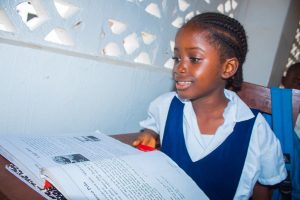The Liberia Education Advancement Program (LEAP) is a multi-partnership educational model that delivers 100% tuition-free primary education throughout Liberia from early childhood education through Grade 9.

- How LEAP was founded to help address Liberia’s decimated primary school system
- The program’s innovation focus and ambitious goals
- How this multi-partnership model works
- The proven benefits of the program’s scalability
- The critical importance of monitoring and evaluation in LEAP’s framework
- Brief highlights of key results achieved during the program’s first five years
- How LEAP responded to the COVID-19 pandemic
- The program’s current state, and
- Where the program is headed in the future

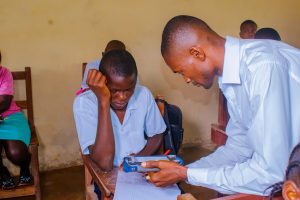
Launched in 2016 by the Government of Liberia as the Partnership Schools for Liberia, LEAP started as a three-year pilot to test if a multi partnership educational delivery model could accelerate improvements in the country’s primary public education system after it had been decimated by 14 years of civil war and the Ebola health pandemic.
These dual calamities left educational destruction in their wake. Children were not attending school, educational infrastructure was crumbling, teachers weren’t showing up for work, and an entire generation was at threat of being left behind:
- Less than 20% of Liberia’s primary schools had solid physical structures
- Fewer than 40% of children attended primary school
- More than 80% of students were at grade levels dramatically lower than expected based on their age
- Only 20% of 5th grade girls could read a single sentence
-Liberia’s traditional public school systems couldn’t solve this crisis on their own. Additional resources and approaches were required to support and complement their existing efforts.-

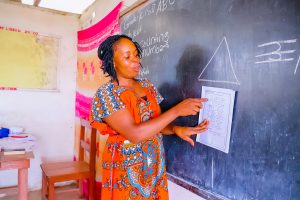 Rebranded and enhanced in 2018 as the Liberia Education Advancement Program by the democratically elected government of President George Weah and now under the direction of Liberia’s Minister of Education, Hon. Professor D. Ansu Sonii, LEAP is designed to improve school management and accountability, enhance teachers’ and school administrators’ abilities to deliver quality learning outcomes, and optimize delivery models that the Ministry of Education can apply throughout all of Liberia’s public schools.
Rebranded and enhanced in 2018 as the Liberia Education Advancement Program by the democratically elected government of President George Weah and now under the direction of Liberia’s Minister of Education, Hon. Professor D. Ansu Sonii, LEAP is designed to improve school management and accountability, enhance teachers’ and school administrators’ abilities to deliver quality learning outcomes, and optimize delivery models that the Ministry of Education can apply throughout all of Liberia’s public schools.
In order to succeed in the long run, innovations like LEAP require constituent buy-in. The Ministry of Education consulted with key civil society stakeholders nationwide during the pilot’s second year to gather feedback from community leaders, parent representatives, teacher groups and many others on how the program could best serve Liberia’s children and create greater access to quality education.
As a result of this outreach, coupled with its proven educational outcome results, the program today has broad stakeholder support. In 2022, LEAP was added to Liberia’s Local Education Group (LEG), which is composed of the Ministry of Education, as well as local, national, and global education stakeholders helping to chart Liberia’s educational future.
LEAP maintains several goals that have not only served as the foundation for its successes since 2016, but continue as the beacons for its forward momentum and growth:
- Accelerate improvements in Liberia’s public education system
- Establish evidence-based interventions to increase optimal student learning outcomes
- Improve the physical infrastructure of primary schools
- Support a more engaged and empowered workforce in LEAP schools, including teachers, administrators and other staff
- Implement best practices for school administration and learning, and share these “innovation lab” practices throughout Liberia’s public education system
- Create a scalable and sustainable model that delivers high-quality learning at a low cost to fit future domestic education budget plans

In the LEAP multi-partnership model, the Liberian government maintains 100% ownership and control of the program, and monitors and staffs every school. The partners support the educational service provision at these public primary schools through professional development training, innovation, community building and quality assurance aligned with the Ministry of Education’s public education curriculum and Liberian laws. LEAP teachers are employed by the government and receive continual professional development and training from the partners, which in turn supports better learning outcomes among the pupils.
LEAP has been designed to build capacity within Liberia’s existing public education system. It aims to: 1) improve learning and other educational outcomes, 2) improve school management and accountability, 3) optimize delivery models that the Ministry of Education can apply to other Liberian public schools, and 4) generate data and improve impact-driven decision- making throughout Liberia’s education system.
After starting with eight education partners in 2016, LEAP’s current four partners (Bridge Liberia, Rising Academy Network, Street Child of Liberia, and Umovement) are high-performing local and international education specialists, all of whom have been part of LEAP since its inception.
The partners’ organizational structures feature a mix of social enterprise and non-profit business models, and they have the flexibility to apply their curricula, professional development training, staff coaching, educational methodologies and pedagogies within the LEAP framework and Liberia’s
national curriculum.
Critically, LEAP’s innovation lab model, in which the partners design and rapidly test solutions, supports educational transformation and robust evaluation of learning outcomes. Based on their efficacy, the Ministry of Education decides which innovations have the best cost-benefit ratio and qualify for national rollout within LEAP schools and other public schools nationwide. Among LEAP’s innovations that have been applied throughout all of Liberia’s primary schools are stronger child safeguarding protocols, full-day school programming, and enhanced gender equity initiatives.
Complemented by the strong working relationship between the Ministry and educational partners, capacity building is key to the program’s performance and growth. LEAP has helped reshape how the Ministry continually improves and builds educational capacity across the entire spectrum of Liberia’s public education system, and the program has been a leading contributor to the Ministry’s overall objectives throughout the government’s first term in office.
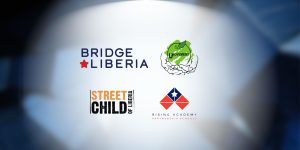
-Greater access to quality education is a key driver in reducing and eliminating poverty, and promoting the individual development required for national economic prosperity.

Starting in 2016 with 93 schools serving 28,000 students, LEAP partners today manage 487 primary schools, in all 15 of Liberia’s counties, that serve more than 120,000 students enrolled from early childhood education through Grade 6, with fewer classes dedicated for Grades 7-9. At the end of the first semester of the 2022 academic year, more than 40,000 of those pupils, or approximately one-third of the program’s total student population, are enrolled in early childhood education grades (beginner, nursery, kindergarten), thus demonstrating the LEAP education partners’ support of pre-primary enrollment and provision.
Gender balance and equality are program hallmarks and continue to progress. In the 2022 academic year’s first semester, LEAP’s pupil gender equity ratio is 47% female vs. 53% male.
There are currently 3,549 teachers and a total of 4,300 staff members in the program. Further, 86% of LEAP’s teachers have C-certificates or above, making them qualified to teach primary school.
The total number of schools managed by the current four LEAP partners has grown by 650% since the program’s inception, and 50% from 2021 to 2022, despite the challenges posed by the COVID-19 pandemic. Total LEAP pupil enrollment grew by more than 60% from 2021 to 2022.
This multi-partnership model has proven its suitability at “meeting students where they are” in Liberian cities and rural communities. Since 2017, LEAP has served the country’s historically underserved southeast region,
and from a socio-economic equity perspective, a 2021 independent research analysis reported a 97% probability that the families of pupils of a LEAP partner are living on less than USD 2.50 per day. These findings are highly reflective of the other three LEAP partners who work in similar socio- economic contexts. The international poverty line, currently USD 1.90 per day, is the universal standard for measuring global poverty and helps identify the number of people living in extreme poverty.
As the LEAP program has scaled throughout Liberia, greater cost efficiencies have resulted. On a weighted average basis, the per-student annual delivery costs for the four current partners have decreased a total of 78%, from $304 in 2016 to $66 in the 2022 academic year’s first semester.
“This strong accountability, paired with the freedom to try innovative methods new to the Liberian school system, ensures high-quality education for current students while promising a better experience for future learners…these lab schools are continuously increasing operational efficiency as the number of schools grows within the cohort to match long-term governmental education budgets under economies of scale. Due to the integration of the lab schools into the public education system, this innovation tested in the LEAP model could be fully institutionalised, leading to an educational ecosystem that constantly strives for the highest educational returns at scale.”
— New Allies: How Governments Can Unlock the Potential of Social Entrepreneurs for the Common Good. (Published in January 2021 by Ashoka Deutschland gGmbH and McKinsey & Company, Inc. in collaboration with Catalyst 2030, an organisation co- founded by Ashoka, Echoing Green, the Schwab Foundation for Social Entrepreneurship, and the Skoll Foundation.

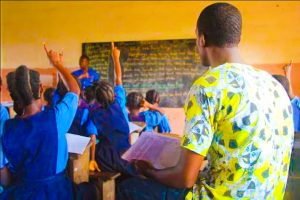 Comprehensive and rigorous program monitoring, evaluation and verifications are critical to supporting LEAP’s overall goals of rapid educational innovation and learning outcomes improvements.
Comprehensive and rigorous program monitoring, evaluation and verifications are critical to supporting LEAP’s overall goals of rapid educational innovation and learning outcomes improvements.
The government’s regional education officers conduct routine monitoring of all LEAP schools, including joint school visits with the education providers, child safeguarding evaluations, and attendance at partner-led training. In addition, the four education partners employ their own school performance managers who are responsible for monitoring, evaluation and impact measurement.
Further, each LEAP partner is directly monitored by the Ministry of Education for the performance of its allocated schools through county education officers and other monitoring infrastructure available to the Ministry. Spot check evaluations by these monitors assess such issues as teacher presence in classrooms, teacher presentation techniques and instructional material availability.
LEAP’s monitoring and reporting are used to inform the design of a system- wide quality assurance framework. Key performance and description indicators for the partners against Ministry of Education criteria were introduced in 2018 and are updated annually. In 2022, 100% of LEAP schools have pupil safeguarding policies and monitoring leads in place.

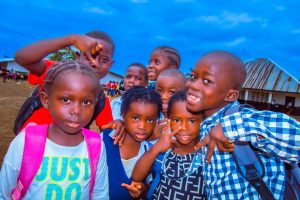
- Learning Outcomes: Results from a 2019 Randomized Control Trial conducted by Washington, D.C.-based Center for Global Development showed that students at schools run by the current LEAP partners outperformed their peers at randomly-assigned Liberian comparison schools by the equivalent of 1 1/3 – 2 1/2 additional years of schooling.*
- Academic Focus: LEAP students spend nearly an hour more on academics per school day than non-LEAP peers. LEAP teachers devote 73% of class time on academics, versus 61% in comparator countries.**
- Classroom Time: LEAP schools were the first in the country to teach a full school day, which provides a more enriching educational experience for students. This approach has now been extended to all Liberian schools to allow sufficient time to teach the full curriculum.
- Cost Effectiveness and Replicability: LEAP reduces costs as it scales and delivers quality learning at a significantly lower cost than most externally funded alternatives in the Liberian school system. LEAP per- student annual delivery costs have decreased a total of 84%, from $304 in 2016 to $49 in 2022. The model is replicable to contexts seeking low- cost quality learning alternatives with long-term sustainability.
- Innovation: LEAP’s innovations include the introduction of tuition-free early childhood education, child safeguarding protocols and distance learning solutions.
- Administrative: LEAP has highlighted the challenges of getting teachers on payroll, which has catalyzed reforms to improve the government’s
entire educational payroll system.
- Training: The intensive teacher and staff training conducted by LEAP partners has not only improved the LEAP educational workforce, but has also been extended to non-LEAP schools, thus increasing the efficiency of the government’s education system.
* The range is based on treatment effect estimates that factor in whether students stayed in the program (Treatment on Target) or left LEAP schools for any reason (Intention to Treat).
** Source: Stallings Classroom Observation System

Like countries worldwide, COVID-19-enforced school closures in Liberia disrupted education on a massive scale in 2020 and 2021. LEAP’s education providers joined the government’s Education Emergency Task Force to address a wide range of COVID-related issues.
With their foundational innovation focus that promotes fast reorientation and execution, LEAP partners supported the Ministry of Education in creating a sector-wide strategy for continuous learning during the COVID crisis. The task force’s distance learning strategy resulted in the Ministry receiving a USD $7M Global Partnership for Education grant to support Liberia’s COVID response efforts.
During the COVID-19 school closures, the Ministry of Education established a Distance Learning Project for students nationwide. LEAP’s education providers were key partners in this effort to keep Liberian students, parents and caregivers, and communities engaged in learning and education when students were unable to attend schools in person.
Among the initiatives deployed by LEAP’s partners during the COVID-19 pandemic:
- Technical and research support for the Ministry of Education about health, education and livelihood impacts of COVID-19
- A distance learning initiative called “Teach By Radio” was created within a few weeks of the school closures. Its free lessons — which were available through digital means and nationally accessible — focused on
numeracy, literacy and listening skills. Portable radios were also provided to many households. Teach By Radio will become a national legacy program with a dedicated radio studio for future educational needs.
- Mobile and digital daily practice content and quizzes accessible via basic mobile phones, smartphones and computers
- Homework packets distributed through safe, socially distanced means
- Continual engagement with students, teachers and school communities to raise awareness about COVID-19 and the importance of continuing with education during the pandemic’s disruptive period.
-Resiliency is ingrained in Liberians. Whether civil war, Ebola or the COVID-19 pandemic, nothing stands in the way of Liberia’s resolute determination to create a brighter future for its children.-
 The Ministry of Education is committed to supporting LEAP with its intent “…to formalize the LEAP program into our official 5-year Education Sector Plan (2022-2027), thereby demonstrating to the global aid community that this is a priority program for which we seek long-term funding.”
The Ministry of Education is committed to supporting LEAP with its intent “…to formalize the LEAP program into our official 5-year Education Sector Plan (2022-2027), thereby demonstrating to the global aid community that this is a priority program for which we seek long-term funding.”
A 2022 analysis offering input to the Ministry of Education on LEAP’s current state and future opportunities — “Integrating the Liberia Education Advancement Program (LEAP) Within the Liberian National Education Sector Plan 2022-27” — identified multiple strengths of the program, notably:
- LEAP has brought significant additional funding/expertise into Liberia
- LEAP has the strong support of the Government of Liberia and of Liberian communities
- LEAP consistently delivers learning gains at scale
- LEAP has introduced innovations which have the potential to support system-wide impact in Liberia
- The LEAP partnership model has proven to be dynamic and flexible
- The LEAP model is based on a clear accountability for delivering learning outcomes
- LEAP observes only minor disparities between male and female pupils across a range of metrics
- LEAP schools provide a model for data collection/utilization in Liberia
- Per-pupil unit costs have reduced to a point where they are potentially sustainable system-wide
- LEAP has been a model for government-led, evidence-based, adaptive programming
The report recommended that LEAP continues to build upon its strengths within the context of Liberia’s broader policy and operational framework for basic education. Its recommendations for the Ministry of Education included: 1) maintaining, and potentially expanding, LEAP partner school- level support, 2) increased investment in identifying and embedding LEAP benefits throughout Liberia’s education system, 3) bolstering the program’s governance and administration, and 4) incorporating a future variant of LEAP in the Ministry’s 2022-2027 Education Sector Plan which guides the nation’s public education strategy.

While COVID-19 delayed LEAP’s initial scaling, the program’s next phase will focus on rapid replication of the operating model so that more LEAP schools can be opened nationwide, with a goal of reaching 750 schools serving 166,500 students. Through this scaling, more pupils, families and communities will benefit from the program, and the unit cost of educating each student will continue to decline.
With several philanthropic funders currently covering costs to support school operations, project coordination, capacity building and external evaluation, LEAP is now seeking additional funding partners and impact investors to support the program and individual partners through the COVID-19 recovery phase, as well as LEAP’s transition to the working-at- scale phase.
On the public side of the partnership, the Ministry of Education committed to raising its domestic annual education spending from $50 to $100 per pupil in the coming years.
At the 2021 Global Education Summit for Financing the Global Partnership for Education from 2021-2025 in which he proclaimed education as the “equalizer of the whole world,” Minister Sonii pledged that not less than 15% of the Liberian government’s budget will be dedicated to education, with a goal of reaching 20% or more during this period.
